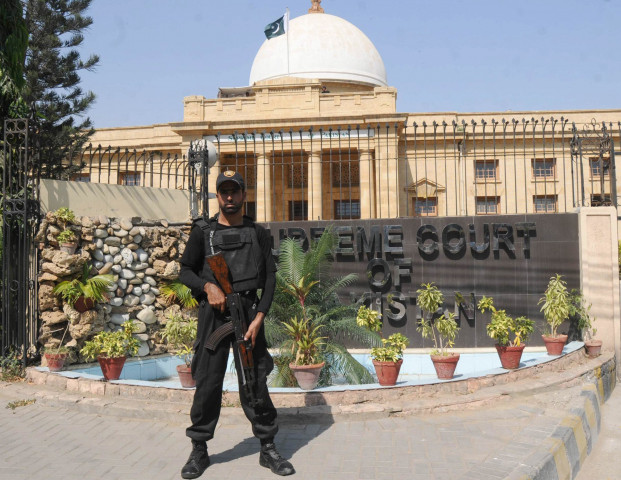Karachi law and order case: Three months on, apex court still unimpressed
Judges reprimand law enforcers for only suggesting steps to curb crime instead of taking action .

Would they disband militant outfits on your invitation? remarked Justice Khilji Arif Hussain to the Rangers representative. PHOTO: EXPRESS/RASHID AJMERI
Tired of reports with suggestions instead of concrete results, the three-member bench of the Supreme Court raised their concern on Monday that if law enforcers merely kept filing reports, who would eliminate the no-go areas and militant wings of the political parties in the city.
The apex court’s observation came on a report filed by the Rangers Director General Rizwan Akhtar, which proposed that the police force be depoliticised, political parties’ militant wings should be disbanded, no-go areas be eliminated and a campaign be launched to deweaponise the city.
The bench of Justice Anwar Zaheer Jamali, Justice Khilji Arif Hussain and Justice Amir Hani Muslim, resumed the follow-up hearing of the Karachi violence suo motu case on Monday and observed that despite the law enforcers’ undertaking to improve law and order in April, nothing had changed over the last three months.
“The situation of residents of Lyari is most miserable,” remarked Justice Khilji Arif Hussain, referring to the recent mass migration the Kutchi community members following intense fighting with the defunct Peoples Amn Committee.
“I’m disturbed by this odd situation,” he said while asking Lyari police’s senior superintendent, Tariq Dharejo, about what measures had been taken to control the situation.
Dharejo, however, replied in the same manner that most government officers do by giving the excuse that he was posted in the area only two weeks ago. This response only irritated the bench members who repeatedly asked him to show the progress he made during the two weeks of his appointment.

Justice Anwar Zaheer Jamali, who headed the bench, told the officer that the Rangers chief in his report had pointed out the police’s involvement in criminal activities.
Absence irks judges
Major Ashfaq Ahmed, who appeared in place for DG Rizwan Akhtar, told the court that the Rangers had made significant progress in restoring peace by conducting operations and had arrested 101 suspects who were later handed over to police. He, however, much to the judges’ disappointment failed to disclose the charges under which the suspects had been arrested.
Referring to the numerous suggestions in the DG’s report, the bench reminded Major Ashfaq that it was the Supreme Court in the first place which had taken notice of deteriorating peace in city and had suggested various measures, including disbanding political parties’ militant outfits.
“Would they disband militant outfits on your invitation?” remarked Justice Khilji Arif Hussain, referring to the failure of the paramilitary force to take such steps on its own instead of suggesting so. “This is all eyewash,” quickly added Justice Amir Hani Muslim, who specialises in criminal trials.
The judges also pointed out a mentally challenged person from the list of the people arrested in the Rangers DG’s report, asking what the man had been charged with. Major Ashfaq was also reprimanded for submitting a report which was not even signed by the Rangers DG.
For his part, Lyari SSP Dharejo tried to convince the court that they had killed notorious criminal Saqib Boxer in an operation.
Prisoners escape
The judges took serious notice of the three under-trial prisoners who escaped from the Anti-Terrorism Court, remarking that SSP South had failed to ensure security at the lockup even thought the SC’s monitoring judge for ATC, Justice Anwar Zaheer Jamali, had highlighted this issue some time ago.
The bench summoned IG Prisons police on Wednesday to explain defiance of the SC’s order.
Condition of prisons
The judges observed that the condition of prisons had worsened even more as convicts were hatching conspiracies in the prisons to kill the people outside.
“Under the eighteenth amendment, law and order is a provincial subject,” the judges noted, turning down a lawyer’s request to call the interior ministry’s secretary as provincial authorities had failed to improve peace situation.
They said that even the CCTV cameras lacked the facility to help identify the persons in video footages. The bench summoned Sindh chief secretary over the issue on Wednesday.
The bench also called reports regarding escape of prisoners from the ATC and release of prisoners on parole by the next date.
Published in The Express Tribune, July 16th, 2013.



















COMMENTS
Comments are moderated and generally will be posted if they are on-topic and not abusive.
For more information, please see our Comments FAQ